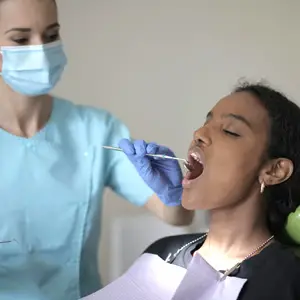Oral Cancer Awareness: Signs and Symptoms
Even with the rising rate of oral cancer across the world, it remains one of the least discussed forms of cancer. Worldwide studies have revealed that in most cases, oral cancer is detected at an advanced stage. The reason is the lack of awareness about preventive measures and limited access to early detection programs.
Now, you might be wondering, do dentists check for oral cancer?
Yes, dentists play the most important role in the early detection of oral cancer. However, knowing the basic symptoms can help you detect oral cancer in the early stages.
Oral Cancer Beginning Signs
Oral cancer can occur in any part of the oral cavity. Some initial signs of oral cancer are patches, lumps, or pain in the mouth. Signs can appear on the lips, tongue, gums, the palate, the inner lining of the cheeks, and the tonsils.
The main reasons behind oral cancer are the consumption of tobacco, alcohol, and products containing areca nut. In North America and Europe, human papillomavirus infections are also a rising cause of oral cancer in young people.
The chemicals in tobacco products can damage a cell's DNA structure. Over time, this damage builds up and causes cancer. That means frequent smokers should be more cautious about lumps on gum and undergo checkups frequently. Preventing the use of tobacco and the other mentioned products can go a long way in reducing cancer risks.
A recent DNS study has confirmed this theory. Jüri Reimand, PhD, Ontario Institute for Cancer Research, mentions, "Our study shows that tobacco smoking signatures in DNA generate these harmful protein-truncating mutations that contribute to the development of cancer and its increasing complexity over time."
Symptoms of Oral Cancer
The early symptoms of oral cancer can vary depending on multiple factors. Some of the common signs are listed below.
- A white or red patch in the oral cavity
- A hard lump in the mouth
- A painful sore that does not heal and bleeds often
- Difficulty or pain while chewing or swallowing
- Difficulty in moving the tongue or tongue, causing problems while speaking
- Prolonged pain in the throat.
- Numbness in any part of the oral cavity
- A feeling of something being caught in the throat for days
- Sudden weight loss
- Ringing or pain in the ears
Remember, none of these signs are a definitive indication of oral cancer. It is easy to confuse these signs with symptoms from other illnesses like allergies and infections. However, if the symptoms persist for over 2 weeks, you should visit a doctor for a checkup.
How to Get a Screening Test for Oral Cancer
If you visit a top clinic for general dentistry in North Carolina, you will find the use of advanced screening tools for oral cancer.
A preliminary screening test for oral cancer involves the dentist checking the oral cavity for any suspicious spots. They can also check the tissues of the throat and neck area for lumps. This involves a visual check and palpation or using the fingers to check the adjoining tissues. You don’t need any preparation for an oral screening test.
Beyond that, the dentist can use a special oral cancer screening dye. The abnormal cells in the mouth will absorb this dye and stand out from the rest. Another method is using a screening light. The light makes the abnormal tissue appear white, in contrast to the healthy tissue which appears black.
Based on the results of the screening, further assessment can be recommended. This can involve a biopsy or cytology, where a portion of the abnormal cells are collected and analyzed.
Tooth Decay
Ozone gas applied directly to a cavity can kill decay-causing bacteria. This can sometimes stop the decay and potentially eliminate the need for a traditional filling. This allows the natural remineralization process to occur, strengthening the tooth enamel.
Frequently Asked Questions
How often should oral cancer screening be done?
The frequency depends on your risk factors. In general, adults over 20 should be screened once every three years, and adults over 40 annually. Those with higher risks may go for screenings up to three times a year.
What is cancer screening of the mouth?
Cancer screening of the mouth is a process where the dentist checks the oral cavity for any abnormal cells.
How do you screen yourself for oral cancer?
The process of self-screening for oral cancer involves cleaning your mouth and inspecting the cheek and tongue for any sores, lumps, or patches. Next, check for any lumps or swollen lymph glands around the neck region and the jaw.
Final Thoughts
The global impact of oral cancer is rising, and it is the 6th most common type of cancer at present. Note that the earlier a cancer is detected, the easier it is to treat. Your dentist is your best friend in the fight against oral cancer and routine preventive care can go a long way in reducing the risks.
The experienced team of dentists at Smiles of Cary offers the full range of dental care and other services to ensure your oral health. Our dentists can help detect the early signs of cancer and provide practical suggestions to reduce the risks. Schedule a comprehensive exam and cleaning today.
Healthy smiles start here in Cary.
Request an Appointment






